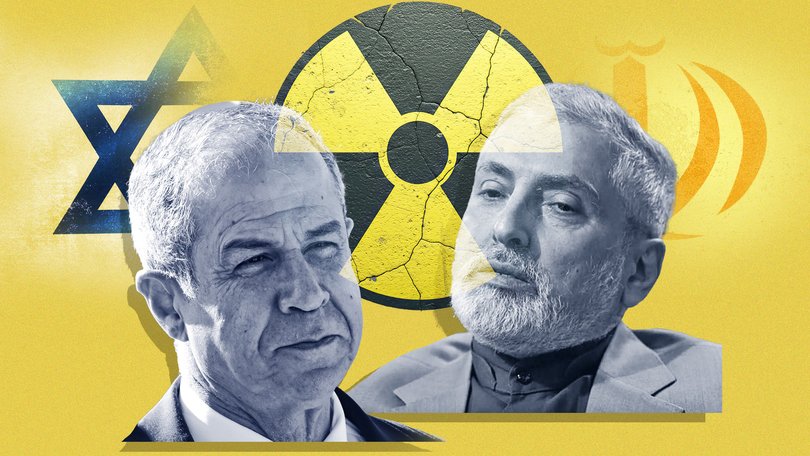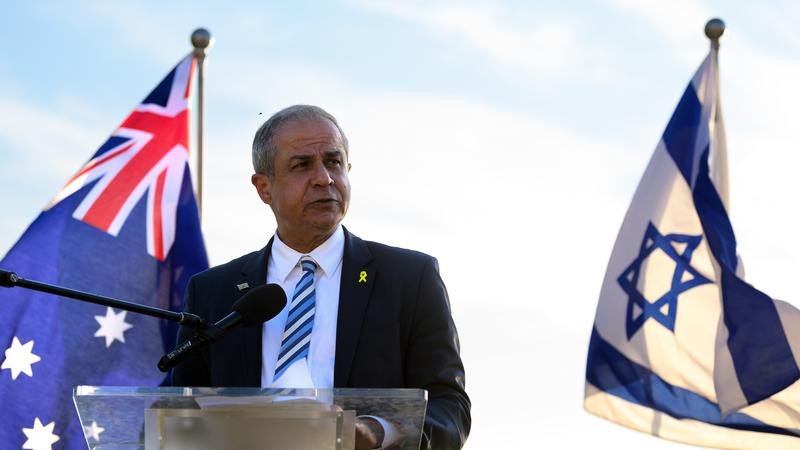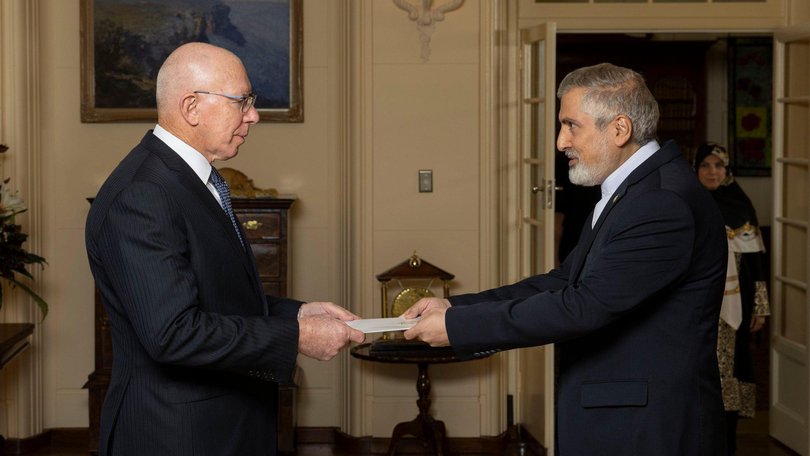Iran, Israel ambassadors to Australia tell of hopes for nuclear and their new reality after war
Ambassadors to Australia from Iran and Israel have revealed their thoughts on the conflict and their hopes for the future.

Israel and Iran have welcomed US President Donald Trump’s declaration that the 12-day war between them is “over”, according to their envoys in Canberra.
In separate interviews with The Nightly on Thursday, Israeli Ambassador Amir Maimon and Iranian Ambassador Ahmad Sadeghi both said their countries were open to a diplomatic solution to resolve the conflict over Iran’s nuclear program.
Although both were hopeful the current fragile ceasefire would hold, they gave a cautious prognosis about the prospects for longer term peace in the complex environment and dynamics of today’s Middle East.
Sign up to The Nightly's newsletters.
Get the first look at the digital newspaper, curated daily stories and breaking headlines delivered to your inbox.
By continuing you agree to our Terms and Privacy Policy.Neither senior diplomat was in a position to offer a full assessment of the damage caused by the United States’ unexpected strikes on three Iranian nuclear facilities, to confirm the extent of the setbacks to the regime’s nuclear plans or what it would mean for the future.
The 12-day conflict that left 28 people dead in Israel and hundreds in Iran was declared over by President Trump at the NATO summit in the Hague, where he also announced his administration would meet with Iran “next week”.
Mr Trump told a news conference the US strikes against Iranian nuclear facilities had reinforced the “credibility of American deterrence” and “paved the way for peace”.
The B-2 bomber attacks on Iran’s nuclear sites, Fordow, Natanz and Isfahan, in an operation dubbed “Midnight Hammer”, had blown them up “to kingdom come,” said the US President.
Mr Trump had previously described the sites as “obliterated”, setting Iran’s enrichment efforts back “decades,” although intelligence reports have given mixed estimations of the military operation’s impact.
An initial leaked classified assessment by the Defence Intelligence Agency viewed the strikes as only delaying Tehran’s nuclear ambitions by a matter of months.
This was dismissed as “flat-out wrong” by the White House, and a later report by Israel’s Atomic Energy Commission (IAEC) said the “devastating” strike “destroyed the site’s critical infrastructure”.
CIA director John Radcliffe has since released a statement saying he has “credible evidence” the program will take years to rebuild, and an Iranian official has admitted nuclear installations were “badly damaged,” according to US media reports.

The Israeli view
As the dust settles on a brief but brutal military confrontation that put the world on edge, Israel’s Ambassador to Australia Amir Maimon said he hoped Mr Trump was right about an end to hostilities. “I hope that the conflict is over for good,” he said.
Israel remained open to a diplomatic resolution to the nuclear threat posed by Iran but had reservations after decades of twists and turns in negotiations that culminated in the 2015 Joint Comprehensive Plan of Action (JCPOA), or the so-called Iran nuclear deal, he said.
The deal offered Tehran sanctions relief in exchange for strict limits on uranium enrichment, stockpile levels and centrifuge use, alongside robust monitoring and verification by the International Atomic Energy Agency.
It was rejected by Israel as it did not reference Iran’s ballistic missile program and President Trump withdrew from it unilaterally in 2018, slapping sanctions back on Iran.
In March 2025, Mr Trump proposed talks on a new nuclear deal, but informal negotiations mediated by Oman became stuck over Iran’s insistence on the right to enrich uranium before Israel launched the first strikes on the regime on June 13.
Israel’s reservations did not mean it was opposed to a diplomatic deal, argued Mr Maimon.
“The alternative to a bad agreement is not a military option. The alternative to a bad agreement is a good agreement,” he said, but added that the outcome should not allow Tehran to continue with any type of enrichment activity on Iranian soil.
“At the end of the day, the Iranians are posing a threat not just towards Israel. Their ballistic missiles can reach nearly every capital in Europe,” he said, adding that Iran should not be allowed to destabilise the region or undermine moderate Arab states.
Mr Maimon said Israel was still in the process of “battle damage assessment” to determine the impact on Iran’s nuclear facilities although some Israeli reports said the Natanz site was “severely damaged” as well as damage to a conversion facility in Isfahan and to some plants manufacturing centrifuges.
There was “no clear information” about the location of 400kg of uranium enriched up to 60 per cent, which the IAEA had raised the alarm over, and which Israel assesses could be used to produce at least eight to ten nuclear devices.
But despite early reports of significant destruction, Mr Maimon warned that “you cannot totally eliminate the Iranian nuclear program . . . They master the technologies. There is no rolling back the knowledge.”
For Israel, the most important outcome of the recent conflict was “the new reality that we created,” he said.
“For many years there were doubts and questions about if, at all, a military option is a realistic option. I think today all understand that it is a realistic option,” he said.
“With our intelligence and our capabilities and with the cooperation with United States of America . . . the Iranians will think twice before they will dare to again violate the international community agreements.”
While the ideology underpinning the development of nuclear ballistic missiles to destroy the state of Israel may not have been abandoned, Iran now understood Israel had the determination and means to remove the threat, argued Mr Maimon.
“We managed to bring the Iranians to understand that we can hit them severely,” he said.
Israel had launched its pre-emptive strike to defend its citizens from an “imminent and existential” threat, and not to trigger regime change, Mr Maimon insisted.
“Regime change was not part of the objectives . . . The operation was all about the elimination of or the mitigation of the Iranians’ nuclear program,” he said.
“The Iranians should be the ones to determine who will be their leader, not the Israelis, nor any other nation,” he said.
A new regime, embraced by the Iranian people, and taking a totally different path to improve the lives of the population and not threaten Israel or any other nation, would be welcomed, he said.
“I think that they can really turn their country into a prosperous and developed and a very modern country,” he said. In that case, “Of course, Israel will be more than happy to cooperate exactly as we are cooperating now with some of our neighbours.”

The Iranian view
Asked about Mr Trump’s pronouncement that the 12-day conflict was over, Iranian Ambassador to Canberra Ahmad Sadeghi, said, “we hope that the situation would be the same as he says”.
But he condemned Israel’s “unprovoked” attacks and strongly denied Iran had been seeking to build nuclear weapons or was developing its nuclear facilities for anything other than “peaceful” purposes.
Mr Sadeghi said Iran had already been engaged for many years in international diplomacy over its “legal and conventional right”, as a member of the Treaty on the Non-Proliferation of Nuclear Weapons (NPT), to use nuclear energy for civilian purposes.
“Iran is ready to come back to the negotiation table, as it was, as it has been in the negotiation,” he said.
If talks were resumed, they would need to recognise Iran’s rights to develop nuclear energy for peaceful purposes, he said.
“Iran is fully ready to be cooperative and give whatever guarantee would be needed, logically, to not divert to the military usage of the nuclear power,” he said, but the country wanted to have the right to do its own enrichment, like European countries or Japan, who also did so for medical research.
“Based on the NPT arrangement, there is no ceiling or limitation for enrichment. It is a matter of negotiation between the IAEA member and IAEA to negotiate the purpose of that,” he argued.
IAEA chief Rafael Grossi had admitted the agency did not find Iran was diverting its nuclear program to military purposes, but too late to block the “disastrous” attacks, said Mr Sadeghi.
It was “very unjust” to judge Iran on “suspicions and assumptions” rather than considering the facts that Iran, an NPT member, had declared there was no space in its military strategies for nuclear weapons, he argued.
“Iran has declared time and again, we do not need to have the nuclear bomb. We are better off with our current situation,” he said.
If Iran was not afforded the “inherent right” to nuclear energy for peaceful purposes as an NPT member, it may consider withdrawing from the treaty in future, he suggested.
While Mr Sadeghi insisted there were no current plans to do so, he said the arrangement had to work “two ways”.
The Ambassador had little information about the damage to Iranian facilities, beyond reassurances that there had been no radiation leaks.
He said the embassy was working with the Department of Foreign Affairs and Trade to help Australians who had been stranded by the recent crisis.
But while Mr Sadeghi said his country was open to diplomacy, he warned against any attempts at regime change or threats against Iran’s leadership, that not only violated international law but would have “very bad consequences” for the region.
Even the mention of threats against a high-ranking official or leader should be condemned, he said.
Iran had no intention to breach the ceasefire but if it was attacked by “the aggressor”, if “they impose again a conflict or attack on us, then we are ready to defend ourselves,” he said.

